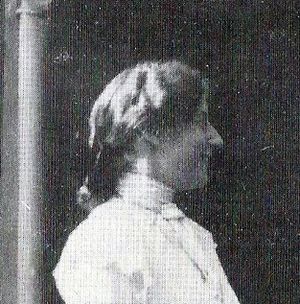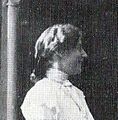Sylvia Leith-Ross facts for kids
Quick facts for kids
Sylvia Leith-Ross
|
|
|---|---|

A picture taken when she was married
|
|
| Born | Sylvia Hope Ruxton 30 September 1884 London |
| Died | 12 February 1980 (aged 95) Holland Park, London |
| Occupation | Anthropologist |
| Spouse |
Arthur Leith-Ross
(m. 1907; |
Sylvia Hope Leith-Ross (born September 30, 1884 – died February 12, 1980) was an English writer and anthropologist. An anthropologist is someone who studies human societies and cultures. Sylvia spent most of her life working and studying in Nigeria, a country in West Africa.
Contents
Early Life in London and Paris
Sylvia Hope Ruxton was born in London, England. Her father, William Fitzherbert Ruxton, was an admiral in the Royal Navy. Her mother, Sylvia Howland Grinnell Ruxton, was from America. Her grandfather was Henry Grinnell.
In 1896, when Sylvia was 12, she moved to Paris, France, with her mother. She went to school there. Sylvia later wrote in her book, Cocks in the Dawn, that she loved France very much from that time on.
Career and Studies in Nigeria
In 1907, Sylvia married Arthur Leith-Ross. She moved with him to Zungeru in Nigeria. Her husband worked there for the British government. Sadly, Arthur died in 1908.
Sylvia returned to Nigeria in 1910 as a widow. She stayed with her brother and his wife. The two women wrote a cookbook called West African Cookery (1908). It was popular with young European men who were new to Nigeria. In 1921, Sylvia published Fulani Grammar. This book helped people learn the Fulani language and included some local folktales.
Helping with Education
In the 1920s, Sylvia Leith-Ross became the "Lady Superintendent of Education" in 1925. She helped start Queen's College, Lagos, which was a boarding school for girls. She also founded a girls' school in Kano. In 1931, she went back to England to get better after being unwell.
Studying Nigerian Women
When she returned to Nigeria, Sylvia received a special grant. She used it to study the women of eastern Nigeria. This was after an important event called the Women's War. Her research led to her famous book, African Women: A Study of the Ibo of Nigeria (1939). This book helped people understand the lives of Igbo women.
War Work and More Books
During World War I, Sylvia volunteered in military hospitals in France. She spoke French very well. This work led to a job at a clinic in London from 1920 to 1925. She also worked in military hospitals during the Spanish Civil War and at the start of World War II.
She stayed in Nigeria for the rest of World War II. During this time, she wrote two more books. These were African Conversation Piece (1944), which was a travel diary, and Beyond the Niger (1951).
Pottery Research
Later in her life, from 1956 to 1966, Sylvia spent ten years collecting pottery. She also interviewed people who made pottery in Nigeria. Her last book, Nigerian Pottery (1970), shared what she found. It had many photographs and was a guide to an exhibit she helped create at the Jos Museum.
Personal Life
Sylvia Ruxton married Arthur Leith-Ross, who was a Canadian officer. He served in Northern Nigeria with Sylvia's brother. Sylvia became a widow at age 24 when Arthur died from a serious illness called blackwater fever.
Sylvia Leith-Ross died in Holland Park, London, in 1980. She was 95 years old. One more book, her autobiography called Stepping Stones: Memoirs of Colonial Nigeria, 1907–1960, was published after she passed away in 1983.
Images for kids
 | Charles R. Drew |
 | Benjamin Banneker |
 | Jane C. Wright |
 | Roger Arliner Young |


